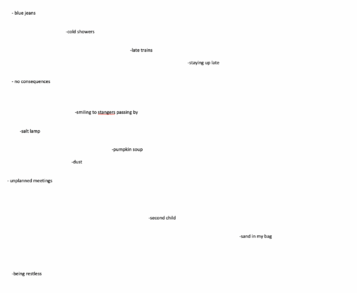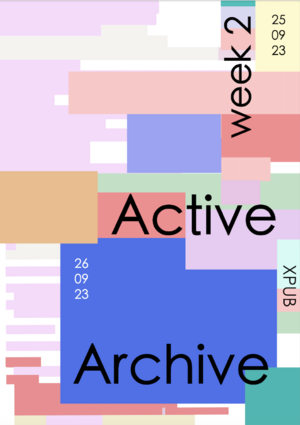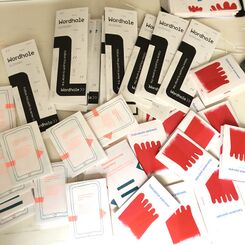User:Mania/Special Issue 22: Difference between revisions
| Line 116: | Line 116: | ||
Zine Camp was wonderful. I had been waiting for this event for so long and I was so happy that I could be a part of it this year. It was nice to tell people what we were working on and see many familiar faces. During the event, I found the courage to conduct several interviews, asking people about their experiences with cooperation and whether they had any advice on how to make the decision-making process in the group efficient. | Zine Camp was wonderful. I had been waiting for this event for so long and I was so happy that I could be a part of it this year. It was nice to tell people what we were working on and see many familiar faces. During the event, I found the courage to conduct several interviews, asking people about their experiences with cooperation and whether they had any advice on how to make the decision-making process in the group efficient. | ||
I have prepared 3 zines: | I have prepared 3 zines: | ||
* Activate the archive by setting your notes in motion | |||
* Toe dancing | |||
* Wordhole glossary | |||
=Week 8= | =Week 8= | ||
Revision as of 16:38, 12 November 2023
Special Issue 22 notes, observations, reflections, findings
Week 1
Tour at WORM
Monday 18.09.2023 We met in Worm for a tour led by Lukas Simonis, Ash Kilmartin and Florian_Cramer|Florian Cramer.
Field Recording
We were experimenting with a cassette player. Based on the discussion on Radio aporee we where asked to find a field recording that triggered a memory. My sound explorations ------>>> /Field recording
Shownotes discussion
some takeaways
- Reading with the music background
- HOW TO USE VOICE DIFFERENTLY take advantage that we can whisper, talk sloooow or whatever, use our voices at the same time
- Guide listeners.. ask them to close their eyes ….
mention what is the intention of the song that we play. Make people imagine more Talk about specific details, smells, textures and use sounds for that
- For a moment remided me about scenes witrh beans hahahha
- Clear devision betweeen sections
- using the etherpad as a script. Communication between the caretakers and the classroom through etherpad has some potential
Prototyping
We set up a Raspberry Pi and create our own personal user profiles. Commands we used:
- Log in to the pi:
ssh thijsoid@145.24.139.16 - Broadcast a message:
wall [message] - Print to the lineprinter:
echo "[message]" > /dev/usb/lp0
Methods
How do I annotate?
I like how we decontruct text while annotating together, creating a patchwork
Steve:
- "Every text creates a reader."
Week 2
Active Archives
pad of today--->>> https://pad.xpub.nl/p/SI22-Monday-Sept-26
- Redefining terms like Sharing, Network, Public/Private
- Understanding the history of networked computation, and an ability to trace to contemporary practices and to make strategic decisions in creating new work
Radio Worm
This week together with Anita and Wang we were caretakers in Radio Worm. We wanted to reflect on movement, that refer not only to the body movement but everything around s which is in a contant change. Additionally we were exploring the topic of autorship, creating new meanings and interpretations. Notes for the audition can be found here ------->>>/Radio Worm
Week 3
Collaborative approach
Week 4
Activating archive
This week I thought a lot about how I understand the concept of an archive. I prepared a mind map in which I listed various concepts and keywords relating to the problems or challenges that archives face. I was wondering about the selection of individual information, documents or files. I find it interesting the process of selecting what will be included in the archive and what is not important enough to be there or is simply omitted or does not fit into existing categories. This suggests that there is an inside and outside of the archive. I wanted to take a closer look at what stays outside the archive. Perhaps instead of trying to assign everything to existing categories, we should observe reality more closely. Perhaps deconstructing the existing order is the first step to start thinking about the problem of archive exclusivity.
How to emerge order from a mass of unordered information? It's so subjective.
My reflections are not intended to find a solution and design a functioning archive, but to take a critical look at the challenges and potential opportunities. I'm working on a website that will be a critical commentary. For this purpose, I have prepared a mind map with entries which I combine to create a network of dependencies. I try to visualize my thoughts about archives.
Protocoling
Protocols protocols protocols
Protocols in relation to what? In relation to collective work / trechnolgy???
Non-human protocols Discuussion during the radio show reminded me about Zoop ( https://nieuweinstituut.nl/en/projects/zoop ) An organisational model named 'Zoöp' was created to promote collaboration between nonhuman and human life while protecting the rights of all zoë, which is Greek for 'life'. The zoöp paradigm incorporates nonhuman life's concerns into organisational decision-making.
Methods
In method class we were working on a glossary. It made me think of the limitations of language. How precisely can we talk about ideas and concepts. How different I am when I speak Polish and when I speak English. Ludwig Wittgenstein said "The limits of my language means the limits of my world" Accordinh to Wittgenstein with our language we cannot fully describe reality. How does such a statement relate to the topic of archives? Are we really limited to what we can verbally understand and express?
Week 5
Autumn break
Most of the time this week was dedicated for zine camp preparation and individual projects. We have been working in smaller teams on zines related to the topics we have covered in recent weeks. We also tried to take into account the tools we learned and reflect on the insights that we gathered so far.
Week 6
Week 7
Zine Camp
Zine Camp was wonderful. I had been waiting for this event for so long and I was so happy that I could be a part of it this year. It was nice to tell people what we were working on and see many familiar faces. During the event, I found the courage to conduct several interviews, asking people about their experiences with cooperation and whether they had any advice on how to make the decision-making process in the group efficient. I have prepared 3 zines:
- Activate the archive by setting your notes in motion
- Toe dancing
- Wordhole glossary
Week 8
Multi-layered documentation
When working in a group, we have so many different perspectives - I think this is the strength of the group. It's interesting to see how each of us gets something different out of this process. We all participate in the same classes and the same discussions, and each of us documents this process in such a different way. Looking through the wiki pages of other people in the group brought to light things I had forgotten or hadn't noticed. Seeing this material through different eyes was refreshing and triggered new observations. I think that's where the revitalization and activation of the archive lies for me - in being able to take a different perspective.



